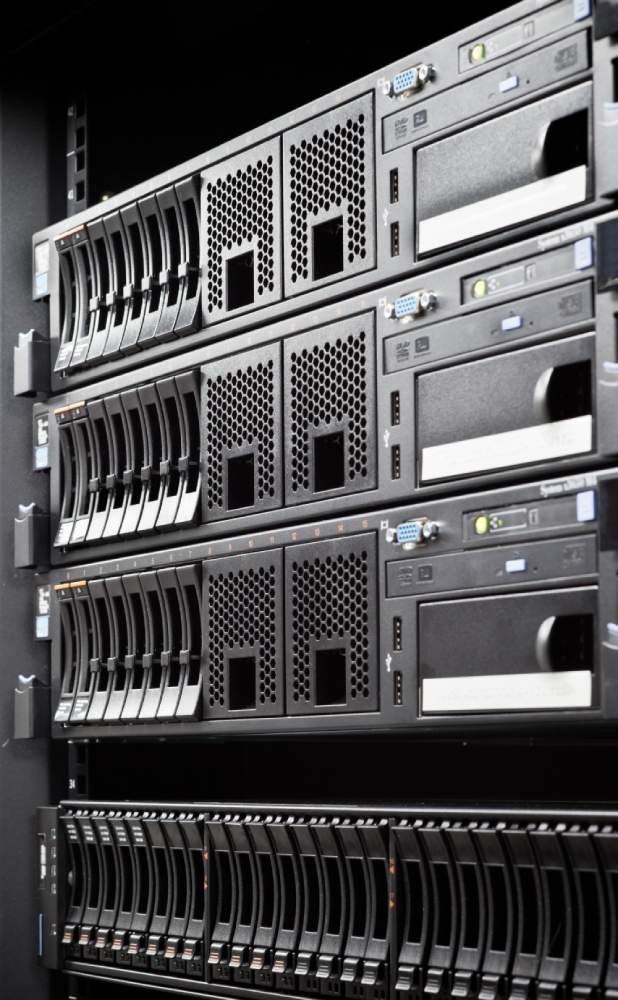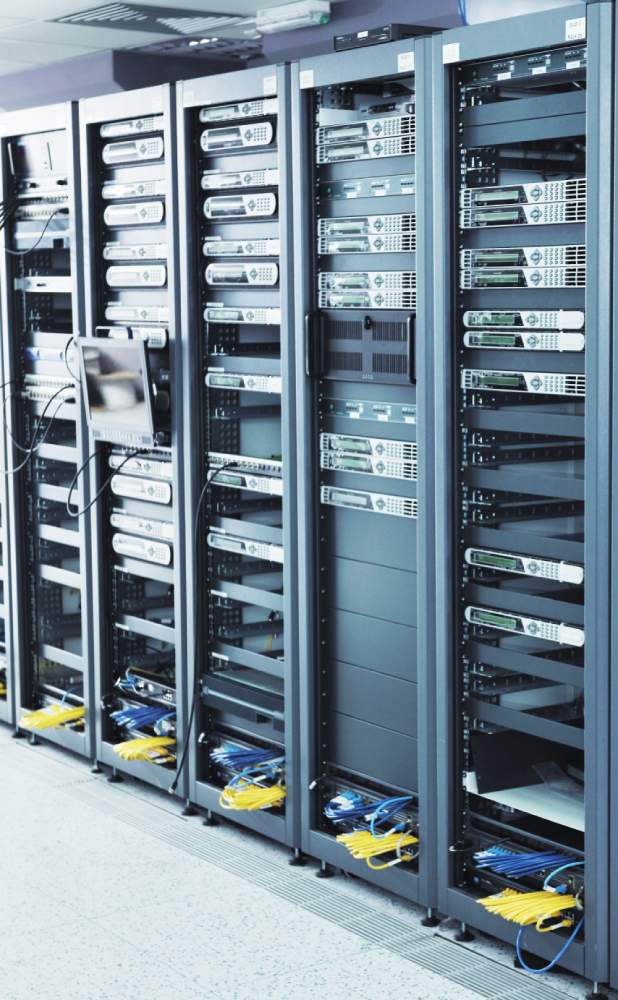Server Rack Colocation in Our Data Center
Server racks are the backbone of every data center’s infrastructure. In a colocation environment, these racks securely house servers, networking gear, and computing components for businesses of all sizes. They are built to a uniform design that complies with size and form criteria that are specifically engineered to accommodate the computer equipment they enclose. This form of sizing is expressed in “rack units,” typically just (U), and provides a simple means to further categorize and subsequently physically manage hardware within a data center or computer room environment.
What Purpose do Server Racks Serve?
There are several main tasks that server racks do for data centers. First, they consolidate all the computer hardware into a single location, simplifying management, enhancing cooling efficiency, and optimizing space utilization within the facility. Second, they prevent unauthorized access by providing a secured area for all the computer hardware. Lastly, because everything is in one place, racks make installing equipment and carrying out work easier, as well as providing free access for the technician for protection and completing maintenance.

Start Building Your Company IT infrastructure with Our 1/4 Rack Colocation Solutions
Are you a start-up, a developer, or a small tech company? Our 1/4 rack space provides the perfect combination of flexibility, scalability, and cost-effectiveness. Start small and expand as your needs grow without the high costs associated with larger colocation spaces.
Each 1/4 rack includes:
- 100 Mbps of unlimited bandwidth for fast data transfer.
- 6000 Watts of power, providing 50 Amps at 120 VAC.
- 2 fixed IP addresses for uninterrupted connections.
- Carrier Neutral connections from leading ISPs.
Secure your business’s technological base with our 1/4 rack colocation solutions. Begin building your IT infrastructure with us.
How to Determine the Dimensions of a Server Rack?
Understanding what “rack units”, or “U” are, is critical for explaining how much space a server rack gives you. A “rack unit” is what is described as the standard measurement of the amount of vertical storage space one has within the rack, usually 1.75 inches (44.45 mm) in height. Server racks widely come in this measurement, with a max U count of 42U or 48U, providing a clear picture of how big the rack is in terms of height. Server racks range from full-sized to half-sized to 1/4 racks, ensuring the equipment fits well and does not leave unused space. For instance, a full-sized rack could have up to 42U, with 19 inches in width, and around 36-inch in depth, which can hold many servers and networking equipment.
Why are Server Racks Important for Data Centers?
Server racks fulfill various functions during hardware operation. Ranging from supporting the network cable organization, power dispersal, and the means to upgrade and expand equipment. In addition, they also allow for proper airflow and cooling; therefore, the server racks are specifically designed with airflow management in front-to-back or bottom-to-top airflow. The racks’ responsibility for managing airflow, cabling, and power is instrumental in ensuring the reliability and uptime of computer hardware.
Advantages of Hosting Your Servers in a Data Center
Other than saving on costs, hosting your servers in colocation racks provide advantages for businesses looking to improve their IT in a few key areas:
- Scalability: Clients can start with what they need and expand as their needs grow. Co-location racks offer the flexibility to rent additional space or compartments within the same data center without significant capital investment.
- Security: With high-standard security measures in place, co-location racks ensure that clients comply with data protection regulations. Data centers provide physical security, network security measures, and compliance with standards such as ISO and SOC.
- Reliability: Co-location facilities typically offer high levels of uptime, backed by SLAs (Service Level Agreements), due to their advanced infrastructure which includes power redundancies, backup generators, and multiple connectivity options.

The Purpose of Colocation Racks in Data Centers
Colocation racks are specifically made for data centers to hold each customer’s equipment in one place, providing divided and secure sections assigned for each individual client. These racks offer several advantages: by using the space and resources within the data center efficiently; keeping client’s equipment isolated and protected in a designated area; and allowing clients the ability to upgrade and build their IT infrastructure as needed. Mostly, server racks for colocation supply businesses with a place to rent rack space that is cost-effective and keeps their equipment safe.
What are the Key Features of Server Racks in a Colocation Facility?
Colocation racks offer an all-in-one storage solution for housing equipment from multiple clients within a shared data center. Clients receive individual lockable sections to secure their servers to prevent any unauthorized access and safeguard their data. These racks also have separate power supplies that not only grants clients control over their power usage, but also allows them to only pay for what they use. The integration of cooling systems are also a feature of colocation racks which regulates temperatures and prevents overheating. To avoid any mix-up of cables, racks also include organized cable management organizers, which help prevent accidental disconnections.

Ideal Uses for Renting Server Racks
- Small and Medium Businesses: Businesses who need to upgrade their server room without adding extra costs.
- Tech Start-ups: For rapidly scaling tech firms that need to build out their IT infrastructure as it grows.
- AI Hosting: Businesses deploying hosted AI systems that need more power, internet connections, and data storage.
- Cloud Hosting: Companies who are looking to provide cloud services for their clients or IT operations
- Game Hosting: Video game companies and gamers that rely on co-location to host their online gameplay.
- Security Regulated Companies: For enterprising that need to meet strict data security ethics and standards.
- Remote Projects: Construction firms, event organizers, and others in remote locations that need access on the road.

